Inception
 for sequences of violence and action throughout.
for sequences of violence and action throughout.
Reviewed by: Michael Karounos
CONTRIBUTOR
| Moral Rating: | Average |
| Moviemaking Quality: |
|
| Primary Audience: | Teens Adults |
| Genre: | Sci-Fi Action Mystery Thriller |
| Length: | 2 hr. 22 min. |
| Year of Release: | 2010 |
| USA Release: |
July 16, 2010 (wide—3,700+ theaters) DVD: December 7, 2010 |
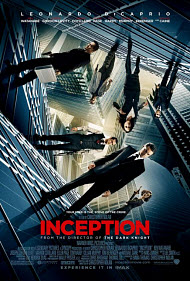

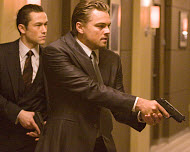


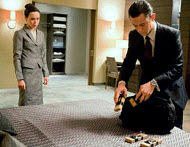

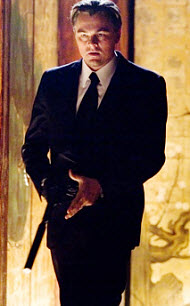

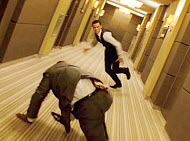
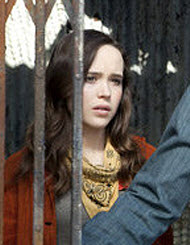
| Featuring |
|---|
|
Leonardo DiCaprio (Cobb) Ken Watanabe (Saito) Joseph Gordon-Levitt (Arthur) Marion Cotillard (Mal) Ellen Page, aka Elliot Page (Ariadne) Tom Hardy (Eames) Cillian Murphy (Fischer) Tom Berenger (Browning) Michael Caine (Professor) Lukas Haas (Nash) See all » |
| Director |
| Christopher Nolan — “Batman Begins,” “The Dark Knight,” “The Prestige” |
| Producer |
| Warner Bros. Pictures, Legendary Pictures, Syncopy, See all » |
| Distributor |
“Your mind is the scene of the crime.”
Review updated July 19, 2010
“Inception,” written and directed by Christopher Nolan, is one of the most complicated sci-fi thrillers you will ever see. The premise is that professional thieves called “extractors” invade people’s dreams to steal information via a drug-induced sleep that is shared by two or more people while connected to a briefcase-sized dispenser. Cobb (Leonardo DiCaprio) and his team hire themselves out as the sleep thieves who risk pain and even permanent loss of consciousness while wandering through the surreal landscapes of other people’s dreams. Eventually, Cobb wants to quit, but he is convinced to do one last job, the most dangerous yet, in exchange for having murder charges against him dropped, and being able to see his children once again. To do so, he has to perform an “inception”: plant an idea in someone’s head.
Cobb’s dilemma is that he performed a sleep experiment with his wife that had unintended results and indirectly led to her haunting his dreams with potentially disastrous consequences. Putatively, his quest is to thwart a malignant corporate entity from expanding its power. The more important purpose of the job for Cobb (and the viewer) is for him to rectify his past mistake and purge himself of the guilt that has crippled his life.
Cobb’s team includes Ariadne (Ellen Page, aka Elliot Page), Hardy (Joseph Gordon-Levitt), and several others, each with assigned tasks and skills. As you watch the movie, keep in mind that every time they utilize the suitcase, they descend one layer deeper into a person’s mind. The norm is two levels, but the last job calls for a descent to the third level, with the unsettling possibility that a mistake or dream-death will leave the person stranded in a fourth level called “limbo” from which there is no return.
The character of Ariadne imparts a mythic aspect to the film’s plot, allowing it to be read as a quest myth as famously defined by Joseph Campbell in Hero with a Thousand Faces. (Campbell’s categories were distilled by Stuart Voytilla in the very useful text Myth & the Movies: Discovering the Myth Structure of 50 Unforgettable Films, which I use in my film class and is accessible to a general audience.)
For those familiar with Freudian theory, it will be helpful to think of the film as an existential march through depth psychology. Kierkegaard’s phrase, “leap of faith,” is used three times in the movie, and the dream-world’s layers roughly correspond to the superego and the id, with their associated characteristics. The superego, as you might expect, has lots of guns, while the id contains the closely-guarded secret. Additionally, viewers who have had Psychology 101 will have fun spotting the categories of Freudian behavior. “Projections” describe the phantom people who inhabit the dream, but numbered among his core issues there are also examples of crisis, regression, repression, avoidance, denial, and displacement—to name the most obvious. (I don’t think anyone will miss the blatant symbolism of the knife.)
The introduction of the term “limbo,” also, raises religious connotations, as the job is performed while everyone is in a plane, a figurative “heaven,” thus juxtaposing metaphysical poles of existence with the objective being to escape limbo and return to the “heaven” of the plane.
Nolan’s script is remarkably clever, and the rules of the dream world are consistent and logical. Every 10 minutes spent in the first level represents one week at the second level, six months at the third level, and an indeterminate time in limbo. Thus, a ten hour flight could potentially represent 35 years of aging in the third level, and more, if one were in limbo that whole time.
Although there are some regrettable instances of emphatic blasphemy—“Jesus Christ” (2), “Jesus” (2), “G**-damn” (6), “My God” (2), “For G-d’s sakes” (1), “God” (1), “hell” (8), “*sshole” (2), “damn” (2), there are no inappropriate sex scenes or gory deaths.
Christopher Nolan proves once again that he is the most intelligent filmmaker working in Hollywood, crafting art out of genre vehicles like “The Dark Knight” and now “Inception.” This one is a must-see, if you are not squeamish about violence.
Ecclesiastes 3:11 reads:
“He has made everything beautiful in its time. He has also set eternity in the hearts of men; yet they cannot fathom what God has done from beginning to end.”
Great filmmakers like Nolan, yearning toward the eternity hidden in their hearts, and lacking any new way in which to define it, retreat into the metaphysics of the mind. That is why the ultimate conflict in the movie takes place between Cobb sleeping on the plane and Cobb desperately trapped in the dreamworld. The juxtaposition of limbo and its damning potential, with the peaceful assurance of Cobb sleeping in the “heavens” (on the plane) signifies the metaphysical struggle that takes place out of the body and in the soul. Milton’s Satan said something similar:
“The Mind Is Its Own Place, and In It Self
Can Make a Heav’n of Hell, a Hell of Heav’n.”
Thankfully, in the case of “Inception,” there is more of heaven than of hell.
Violence: Extreme / Profanity: Heavy / Sex/Nudity: Mild
See list of Relevant Issues—questions-and-answers.


Moral rating: Better than Average / Moviemaking quality: 5
Moral rating: Better than Average / Moviemaking quality: 4½
Moral rating: Average / Moviemaking quality: 5
There is so much that this movie has to offer, I can’t… express everything there is, but I have to say to the mature Christian whose eyes are open, there are spiritual parallels that are amazing. There is very little sexual scenes; it’s clean compared to other Hollywood big budget summer movies, and very entertaining. Also, it’s one of those movies you might have to watch more than once in order to get all that is happening; I’m gonna watch it again today.
Moral rating: Better than Average / Moviemaking quality: 5
***SPOILER*** Forget the obvious question of whether it was a dream or not—it doesn’t matter. The fact DiCaprio walks off, leaving the spindle to freely spin on the countertop tells me he just flat-out didn’t care. He got what he wanted; dream or reality, the semantics didn’t matter.
Moral rating: Offensive / Moviemaking quality: 5
Moral rating: Better than Average / Moviemaking quality: 4½
As a Christian for 17 years, going to see this film with my mind viewing things in the spiritual, the Holy Spirit was showing me revelation and insight the whole time on the basis of how this movie applies to Earthly life and spiritual life with Jesus. It is also one of those movies that may need to be re-watched for the full impact of what I think God is trying to convey to people. And it came out in a movie. Amazing.
I would encourage anybody to be sensitive to the deep and constant developing and enveloping secrets the Holy Spirit wants to convey to His chosen generation. Through the writing on the walls… You don’t have to look far to find mysteries so deep it’s everlasting. This movie had a profound effect on me, and it may not be the same for everybody. Just think on this thought—do you really think you even know 5 percent of what there is all to know? Of course not. In Eph. 1:3, it says we are blessed with all spiritual blessings. …Just follow the bread crumbs, people.
Moral rating: Better than Average / Moviemaking quality: 5
Moral rating: Better than Average / Moviemaking quality: 5
Moral rating: Better than Average / Moviemaking quality: 4½
Moral rating: Average / Moviemaking quality: 5
I’ve read bad reviews for this film, and they all seem to come from people who were confused or offended by language, violence, or possible Freud ID symbolism in some characters (if you’ve never taken Psych 101 don’t worry about it). If you get confused easy in movies or offended easily, then don’t see it. This movie is like a puzzle, and you really need to think throughout the film.
Hands down, this is the best film I’ve seen this year.
Moral rating: Better than Average / Moviemaking quality: 5
Moral rating: Better than Average / Moviemaking quality: 4
They don’t even make movies like this once a year! Go see it! The reason I’m giving it an offensive moral rating is, interestingly enough, because of some of the very ideas that are presented… It’s so easy to be blown away by the quality of the movie that you can forget to analyze what you’re seeing. There’s nothing offensive visually, but from an ethical point of view, there was something lacking. I thought it was really interesting that there was no commentary on the manipulation and motives involved in the whole dream-creating/idea planting situation.
To sum up what I’m saying: It is an amazing movie. Christopher Nolan is super-intelligent and good at his job. I enjoyed it a lot and will see it again. I just think that when something of this caliber comes along from a non-Christian, do yourself the favor of analyzing what you’re seeing.
Moral rating: Offensive / Moviemaking quality: 5
Moral rating: Average / Moviemaking quality: 5
Moral rating: Good / Moviemaking quality: 5
Moral rating: Good / Moviemaking quality: 4½
Moral rating: Average / Moviemaking quality: 4
The PG-13 rating is appropriate; taking the Lord’s name in vain is not (perhaps it is an opp for us Christians to silently forgive another for using the Lord’s name in vain??). I found it most entertaining and not like other PG13 movies that have sex/sexual content. We had no problem allowing our 14 yr old daughter to see this movie-she found it intellectually intriguing.
Moral rating: Better than Average / Moviemaking quality: 4
Moral rating: Average / Moviemaking quality: 5
The violence is NOT Extreme, I don’t know if the movie reviewer was a scardy or over reacting. The violence was Moderate like in “Tomb Raider” or “The Bourne films,” except neater and a little cleaner. I loved the hard work they did in the film, but I don’t like Ellen Page in here. I recommend this film to people 13 and up.
Moral rating: Average / Moviemaking quality: 5
From a film-making standpoint this movie was fine. The acting was good. I was impressed with DiCaprio, but that is only because I have not seen him in many films, unfortunately. The camera work was good.
From a Christian standpoint, the only thing that I found offensive was some of the language and the violence the reviewer has mentioned. So would I recommend this movie? That depends on if you are a person who can handle this type of movie. If you enjoy this type of film, then it’s worth seeing. If not, I recommend avoiding it.
Moral rating: Average / Moviemaking quality: 4
About and hour and a half into it I started to get restless. I think perhaps they could have done a better job editing it. Some movies are very complex, and you have to watch them more than once to “get it.” I just don’t have the interest in this case. I wasn’t really emotionally invested much in Leo’s character. And lastly, I took one year of psychology in high school, but that was 15 years ago.
I read the reviewer’s comment about the knife and I have to say I wasn’t even aware of any symbolism I was supposed to pick up on. And I am usually pretty aware of things like that. Maybe I would have enjoyed it more if I was into psychology. For Christians, I would say that you can easily skip this one because it really doesn’t have much in the area of spiritual enrichment. Don’t feel as though you are missing out if you don’t flock to the theater for this one.
Moral rating: Average / Moviemaking quality: 2½
However, I was very disappointed that there were unnecessary profanities. There were a few (scattered at times) instances of God’s name being abused (mostly paired with the word d*mn. Also to note, Jesus' name was abused a few (scattered) times as well. These profanities were not necessary and I probably would have considered owning this movie when it came out on DVD. There were a few milder swear words like b*stard, h*ll, and a**hole. If only they refrained from profanities in the script I would have bumped this movie’s moral to an average. Also, some may find the plot a bit on the occult side (since it involves invading the mind) but I personally did not find it related to an occult since it was a fictitious film.
To sum it up, I highly recommend this film, but with caution. Take the PG-13 seriously. I would probably recommend this film to 14 or 15 and up. The violence is intense, but I am glad Christopher Nolan refrained from bloody violence, decapitations, etc. Also, I am very glad he refrained from sexual content. I did not even hear a single innuendo within the whole film. The worst it got was about two brief kisses and a woman wearing a lower cut dress. The main issue is the profanity in this film. This is one of the best made movies (film making wise) of the summer! I think this film has potential to be nominated for best picture, visuals, director, and actor (Leonardo DiCaprio).
Moral rating: Offensive / Moviemaking quality: 4
What was good was the whole storyline with a lot of symbolism that gave the story a feeling of being in a puzzle. The movie making quality was excellent. There is a lot of stuff within the movie that can be discussed and explored with friends. The manipulations of the human mind and the psychology of the main characters were interesting. It was refreshing to see a movie that had good content without all the muck of innuendos that some movies have. Yes, there was violence, but it was not as graphic as most movies are. I wouldn’t bring my 5 year old niece to see it, but I would go see it with my friends who like a good story that pushes the mind beyond the reality.
Moral rating: Better than Average / Moviemaking quality: 5
Moral rating: Average / Moviemaking quality: 2½
Moral rating: Extremely Offensive / Moviemaking quality: 3
Moral rating: not applicable / Moviemaking quality: 3
Moral rating: Very Offensive / Moviemaking quality: 5
Now, I will confess about one thing, about myself: I really do prefer the easier and more simply constructed stories in the movies I myself adore. I never was one for this mind-twist and multi-layered movies… which want you to keep analyzing them and re-analyzing and reinterpreting and over-interpreting them—as if doing that would contribute anything in your life. Therefore, I myself, do prefer the more simple—yet the more INSPIRING, thought-provoking, moral-teaching, encouraging and (more often than not) the “happy” or “happier” movies… So yeah, you guessed it: I’m no fan of MATRIX, either. But let me tell you this: MATRIX was at-least pretty to look at. Costume wise, design wise, action/effects wise. INCEPTION doesn’t even have those better points!!
As I sat in the theater (at the beginning of the movie), admiring Leo Dicaprio’s really beautiful suits and his remarkable acting (Yes, I’m a fan of Dicaprio. I do think he is very-very talented)… I, very soon, began to understand and realize that Chris Nolan has created a movie which is, in more than one sense, ELITIST. Why? Because this, his movie, clearly states—with it’s too complex and too-much-information-and-details-ridden story that it doesn’t really care if you “don’t get it.” So, call me 'stupid or “unsophisticated” or whatever. I’m going to come out and say it: “I don’t get it.” There, that’s done. I didn’t understand the movie INCEPTION, and I’m regretting the 37 shequels I wasted in purchasing the theater ticket for it.
Now, I’ll say furthermore: I don’t care to “get it”, either. I really have better things to do in life and BETTER movies to enjoy and appreciate also! It’s amazing how much this movie is boring. And I’m now addressing all those who agree with me—and all those who also didn’t get why they wasted ticket money on INCEPTION either. It’s NOT that you—the viewers—who are “not smart”. It’s the movie that is impossible in many aspects, chief of them being: impossibly boring.
The reason for which Nolan wants to “punish” his viewers, by obliging them to remember and make sense of too-many details, layers (and their individual logics) and at-least 3 plot-lines or more—is truly clear only to himself. I have seen movies about dreams and the lines between them and reality, such as SOLARIS (with Clooney) and VANILLA SKY (with Cruise). Yeah, I know they’re regarded as “inferior” to Nolan’s work—but I found them far more interesting and MOVING—and also, they were interesting to look at, visually and to appreciate, actor-performance wise, too.
In summary: a movie doesn’t have to be over-the-top-details/info-ridden and CONFUSING in-order to be 'enjoyable'. Mr. Nolan, hear? Yes, the movie has little objectionable content. And that’s good and appreciated—however, is that enough in order to praise the movie as a good one? For everyone? For most, even? Nolan likes to show BUILDINGS. In “The Dark Knight” the buildings in the movie were more of a character than was Batman himself. In INCEPTION Nolan likes to—again—show buildings and this time—he shows them crumbling or changing wild perspectives. Wait now: this is what critics are applauding as “visual style”? Really? It’s not that I don’t “get it” this time. I’m not “buying it”, is more accurate.
Funny thing: in a scene in the movie (“Inception”), one female character asks in the midst of an action sequence: “Wait! In whose subconscious are we in now?” or something like that. I could hear too many giggles and stifled laughter from the audience in the theater, who were probably asking themselves the same question—trying to find humor in the regret of having to watch this incoherent and un-involving mess from Nolan. Why make such a complicated movie? And if Chris Nolan doesn’t care that most (or at-least a considerable amount of people) are not going to comprehend his story—why not “compensate” by giving that “poor-unsophisticated-bunch” (who were only looking for some good involving and absorbing entertainment—the poor schmucks…) something else to admire in this boring movie…?? Because again, skewed buildings don’t really do it for many people, including me.
The movie has NO humor. Two lame attempts at humor, in the entire film produce giggles, or lips moving slightly to a smile, at best… Leo Dicaprio looks good. As do both female characters… All other male characters look like cold-mafia-assassin types. Again, not attractive.
So again. Don’t go with “the hype”. Remember, it was “cool” and “sophisticated” to see and “dig” MATRIX at one era. But when today, some years later, many are asked about that MATRIX trilogy: what is it that they remember MOST from it? The surprising (??) answer is: Will Farrell’s parody of the architect’s “mumbo-jumbo speech” from “MATRIX two”. So, judge for yourselves, and trust yourselves by not falling automatically in line with “the hype” by the critics.
Sadly, Nolan’s movie has surprisingly little interesting going for it. If you have an analytical mind, and want to work it to EXHAUSTION during the viewing of the movie—you might find it “interesting”… phew! Don’t be surprised though, when you get no medal for it. I find it funny that critics bash directors like Michael Bay for showing “too fast” action scenes…? Really? And Nolan showing a van falling from a bridge into a lake below for THREE QUARTERS OF A MOVIE is supposedly “better” and more “classy”? C’mon!
My own HUMOROUS paranoid-theory suggests to me, that in actuality NONE of the critics really understood this new film from Christopher Nolan. But how can a critic say he/she didn’t “get” the new movie from the acclaimed director of “The Dark Knight” and ‘Memento’? “Hmmm… look around… ahh, the other critics are applauding the movie wildly and much… they must’ve ‘got it.’” --… the critic says to himself/herself (“and I better understand this movie when I re-emerges on DVD sometime… till then…”)—Ahh… I’m kidding (or am I?). Did somebody say: “the king’s new clothes”? Oops.
Moral rating: Average / Moviemaking quality: 3
Movie goers, especially women, are going to be disappointed if they are squeamish, don’t like fight sequences, or have issue with overt sounds of human tissue being pummeled by various and sundry objects (not excluding knives, bullets, poles, fists, etc). I mean, gross. Frankly, I am taking time to write this review because I believe there are other like me…who search on Christian Answers.net to get the true feel of a movie and its watch-ability from a Christian standpoint.
The bible says “Be anxious for nothing”. I was TOTALLY anxious during this movie, and I turned to the other wife and said, “Wow. This is stressful”. Other than the movie is stressful (my husband says “intense!!”) and gory/violent (my husband says “action-filled!”) it is a work of art and I wish I could have enjoyed more of it without having to shield my eyes.
I agree with the critics that it is superb, I just feel followers of Christ (especially women) deserve to know it is extremely violent and stressful (“suspenseful” to the exponential degree).
Moral rating: Offensive / Moviemaking quality: 5
Firstly the film is immoral. All of the characters are criminals, yet in this film the audience is encouraged to like them or at least ignore their shortcomings, as if what they do is nothing more than unfortunate or a product of circumstances or society. It’s a sort of attitude that if it’s cool, then it must be good—regardless of the immorality of the situation. See all »
Moral rating: Very Offensive / Moviemaking quality: 3½
It was very warped. If the subtle purpose of this film is to promote suicide as an escape to a higher reality, I think it’s very effective. The huge majority of viewers absorb the meaning at a subconscious level, totally failing to comprehend that suicide has been normalised in their mind! The primary plot is all about using an illegal mind control technique to manipulate a business competitor. I don’t imagine Jesus would condone this. See all »
Moral rating: Offensive / Moviemaking quality: 4
Moral rating: Offensive / Moviemaking quality: 4
Moral rating: Better than Average / Moviemaking quality: 5
As for any “objectionable content,” you won’t find a whole lot here. The violence is to be expected in this genre, but isn’t overdone in any way; most of the swearing was done under very high-stress situations where adults would most likely say such things, and even then it is not used very much.
My only precaution is this: if you are not used to handling mind-blowing plots, I highly recommend viewing Christopher Nolan’s previous films as a warm-up. It took me several viewings to fully grasp “The Dark Knight,” but this entry raises the bar more than a couple notches on more than a few “levels”.
In a world where studios aren’t as tired of sequels, remakes, adaptations, and the like as audiences are, Christopher Nolan is always there to pump fresh and exciting material into the local theater. He has topped himself once again, will he be able to do the same in 2-3 more years? It seems impossible to top this, but knowing him, I’m sure he’s already been working on another masterpiece for several years.
Moral rating: Average / Moviemaking quality: 5
Moral rating: Better than Average / Moviemaking quality: 5
Let’s start with the good. As far as the acting went, it was amazing. There were no choppy parts or parts that seemed forced. The special effects were well done, but not over-done. The plot was interesting and complex; it was a real mind-trip.
I wouldn’t suggest this movie for children under the age of 12, just because the plot may get to be too difficult to follow and understand.
It was easy to identify with the characters as well as their own individual personalities and struggles. The only theme I was able to perceive was that we must face our fears and struggles.
Now, for a little of the bad. Profanity was kept to a minimum. I did head on character use Jesus' name in vain once though. Sexuality was nearly nonexistent, except for a few scenes of woman in what I would consider too revealing of clothing, but it was nothing drastic or overtly sexual. There is a moderate deal of violence in it. Nothing of the extent in “Braveheart” or “The Patriot,” but something more like “Mission: Impossible 3.”
All in all, I found this movie to be extremely entertaining and fun to watch. I would definitely recommend it to people over the age of 10.
Moral rating: Average / Moviemaking quality: 5
Moral rating: Good / Moviemaking quality: 5
Moral rating: Better than Average / Moviemaking quality: 5
This was effecting the dream world by seeing flashes and memories of his past, which effected everyone else’s process of finishing the mission.
For those of you who like action and sci-fi, you won’t be disappointed. There are some scenes that could offend those who are sensitive to certain types of movies, like the moderate amount of violence, and overuse of profanity. All in all, a great blockbuster.
Moral rating: Average / Moviemaking quality: 5
Moral rating: Excellent! / Moviemaking quality: 5
Moral rating: Average / Moviemaking quality: 5
Moral rating: Better than Average / Moviemaking quality: 5


My Ratings: Moral rating: Average / Moviemaking quality: 5